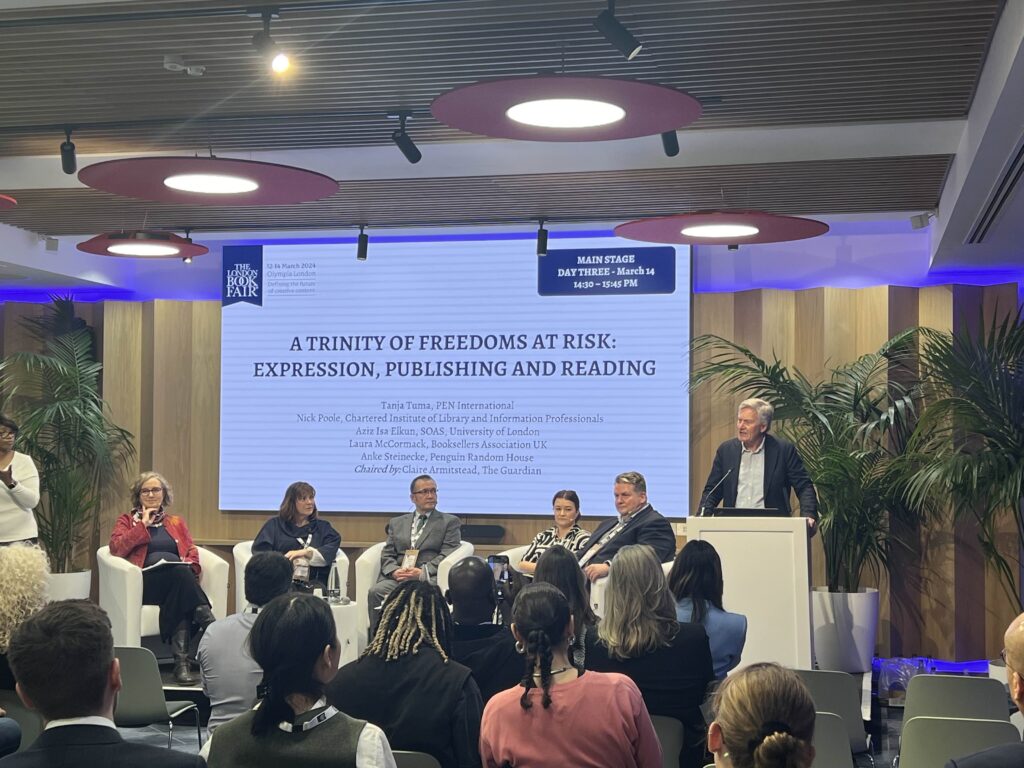The day opened with five international organisations representing authors, publishers, booksellers and libraries issuing a joint statement urging governments and citizens to support the freedom of expression and the freedoms to read and to publish. Read the statement and find out how you can support it here.
The highlight of the day, the session “A Trinity of Freedoms at Risk: Expression, Publishing and Reading,” was a dire reminder of the dangers currently being faced by book publishers, authors, and readers alike in an era where the freedom of expression, the freedom to publish, and the freedom to read continue to be challenged. The international book sector is in the frontlines of such threats, with this session highlighting the ways the “book sector can work together to resist external censorship and self-censorship.”
The session was chaired by Claire Armitstead, Associate Editor, Culture, The Guardian. The panelists were Tanja Tuma, Interim International Secretary, PEN International, Nick Poole, former CEO, Chartered Institute of Library and Information Professionals, Aziz Isa Elkun, Researcher, SOAS, University of London, and Laura McCormack, Booksellers Association UK.
Tanja Tuma spoke of her personal experience growing up in Slovenia before giving a whistle stop tour of the range of threats PEN international sees and closing with the ‘reading list’ of banned books from the USA featured in their latest case file report.
Nick Poole picked up from Tuma’s reference to the USA, to present the situation for UK libraries including school librarians being dismissed and a general climate of funding challenges that make it difficult for librarians to speak out and leading to self-censorship.
Aziz Isa Elkun presented his experience as an Uyghur author and how the situation had deteriorated to the point where no Uyghur books are published, available for sale, or even written. He brought with him a number of books that are now banned and whose authors are in prison.
Laura McCormack recognised the significant contrast between different countries but spoke about the risk of erosion of freedoms. Echoing comments from Poole, she gave examples of booksellers who face threats over the books they stock or display prominently and how that undoubtedly leads to self censorship.
The session then moved on to what can be done, with the speakers presenting a range of options including pressuring countries with restrictive regimes and all underlining the promotion of reading as vital with Tuma referring to the Ljubljana manifesto on higher-level reading.
Armitsead closed the session with a quote from the statement:
True freedom to read means being able to choose from the broadest range of books sharing the widest range of ideas. Unrestrained communication is essential to a free society and a creative culture but carries with it the responsibility to resist hate speech, deliberate falsehoods and distortion of facts. Authors, publishers, booksellers and libraries make an essential contribution to guaranteeing this freedom.
IPA’s Freedom to Publish Committee met earlier in the day. The Committee will now be preparing to review nominations for the 2024 IPA Prix Voltaire, with the call for nominations for the Prix Voltaire running until 22 March 2024.
The day concluded with a dinner for the IPA Educational Publishers Forum, ahead of their meeting to be held tomorrow.
It was a thoroughly successful week in London for IPA, with many members from around the world present and able to meet against the backdrop of a bustling fair. We look forward to next year’s edition of the London Book Fair.
Thursday, 14 March 2024:
- 13:00 – 15:30: ISBN Board Meeting*
- 14:30 – 15:45: A Trinity of Freedoms at Risk: Expression, Publishing and Reading, Olympia, Main Stage
- 19:30 – 22:30: IPA Educational Publishers Forum Dinner*

